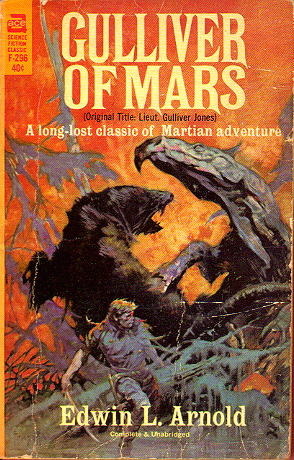Chapter XIX — Gulliver of Mars
byChapter XIX opens with tension concealed beneath the quiet hush of a Martian morning. Gulliver and Heru, cloaked in mist and uncertainty, guide their fragile boat through still waters, aware that a single sound could betray them. The war-canoe of their pursuers cuts through the fog like a shadow of fate. Yet, luck favors the bold. The soldiers sense something but dismiss the notion with grumbling indifference, swayed by what they assume is empty water. As the enemy drifts away, Gulliver and Heru push forward, hearts still pounding but paths finally clearing.
Reaching a sleepy harbor town, they find its people already stirring for the day’s work. There, Gulliver makes a gamble, placing his fate in the hands of a fishmonger, a man whose days are usually filled with nets and scales—not fugitives. Despite the risk, the fisherman listens. Heru, poised yet humble, speaks with sincerity that softens his suspicion. What begins as skepticism turns into sympathy. The fisherman, caught between fear and compassion, chooses the latter. His help is offered without condition, grounded not in strategy but in simple human decency.
Their plan unfolds with the elegance of desperation. A fishing boat, seemingly mundane, becomes their chariot of escape. Covered with rough-smelling nets and hidden beneath layers of bait and burlap, Gulliver and Heru wait silently as the boat rocks gently. When the soldiers arrive, the mood tightens. Questions are barked, suspicions voiced. But the fishmonger, grinning like a rogue with nothing to lose, answers with confidence and a promise of beer waiting at home. The threat passes not through strength, but through charm and cunning. His quick thinking shields the fugitives from capture, buying them the freedom they could not claim on their own.
As the boat glides past the last edge of the town, the danger finally feels distant. Gulliver, ever the gentleman, offers the fisherman a gold button—a token small in size, but rich in meaning. Heru, with a soft word and grateful glance, offers a more heartfelt reward. The fisherman smiles, not for gain, but for the strange pride of having done something noble in an otherwise routine life. He returns to his village unchanged in appearance, yet marked forever by a secret act of courage.
The escape, though successful, leaves Gulliver reflective. Trust had been placed in a stranger, and that trust had been honored. Mars, for all its surreal landscapes and alien customs, remains familiar in this: kindness can be found in the most unassuming places. That the fisherman had no stake in their journey makes his loyalty more poignant. Against the looming backdrop of war and conquest, a single act of quiet defiance speaks louder than armies. It is not grandeur but solidarity that propels them forward.
Their voyage resumes under a calmer sky. The boat now moves beyond familiar shores, into uncharted sea and story alike. Heru sits beside Gulliver, no longer a captive but a companion, sharing silence and sea breeze. The danger behind them recedes, yet ahead lies uncertainty. Still, there is movement. That, in itself, is hope. They are not running—they are choosing.
This chapter doesn’t rely on sweeping battles or vast discoveries. Instead, it thrives on the human scale—on the risk taken by ordinary people in extraordinary moments. The fisherman’s role may be brief, but it embodies the courage to stand for something without promise of reward. Gulliver and Heru, once hunted and cornered, now float free thanks to a bond made in mere minutes but rooted in trust. On a world so strange, it is kindness that remains universal.
As their boat fades into the blue haze, the town shrinks behind them, tucked once again into its quiet rhythm. The fisherman returns to his stall, never to boast of his role. And Gulliver, now one step further from capture, feels something stir—an unfamiliar mix of gratitude and purpose. Not all victories roar. Some come wrapped in fishnets, hidden beneath barrels, and carried on currents of faith.

